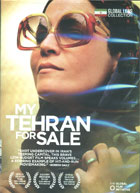
My Tehran for Sale 2009
Distributed by Global Film Initiative, 145 Ninth St., #105, San Francisco, CA 94103
Produced by Amip – ARTE France
Directed by Granaz Moussavi
DVD, color, 95 min.
College-General Adult
Self Identity and Community Identity, Human Rights, Women’s Studies, Politics, Activism, Iran, and Repressive Government, Middle Eastern Studies, Political Science, Sociology
Date Entered: 06/28/2012
Reviewed by Malcolm L. Rigsby, Department of Sociology and Human Services, Henderson State University, Arkadelphia, ArkansasThis low budget film incorporates realism with dramatic effect. Set in Tehran, a young actress, Marzieh, aspires to fame and the good life. We open to see that she is grasping for and to some degree realizing what she believes to be the life of success. Yet, life comes crashing down as she quickly realizes the fragility of life.
Beginning with our introduction of Marzieh we see her as a person not that different from other people we see and relate to each day of our lives. We have hopes, fears, triumphs, and happiness. For Marzieh, her quest is to be a person with dignity and dreams to seek. For a while she sees Saman, a young man she meets who lives in Australia, as the key to her dream. Soon she realizes fully that the lock on the doorway she seeks to open is her government. Rejected by her parents she begins to seek a new life.
Global news since 2001 has continually covered the nation of Iran, its president, and the developing concern of potential nuclear consequences for the world should the Iranian government prefect nuclear capacity. Governments often become the convenient vehicle by which we come to view a nation’s people. Unfortunately, this tendency is a two-way street where all people in all nations become categorized by official channels for news. Westerners may find this film an eye opening experience by which they come to see the Iranian people as individuals, not as a collective known by governmental policy.
Through the eyes of Marzieh, we are offered a glimpse of daily life for young, well educated, and affluent Tehranis. Hermeneutically we can see the despair felt by those who fear that the goals of the 1979 Iranian Revolution failed and left them victims of oppression. In some ways there is almost a feeling of dissatisfaction with the previous generation who they may see as the cause of this current situational life.
This is Moussavi’s first feature film. A poet, but also a filmmaker, Moussavi integrates her professions to create a romantic drama in political and cultural contexts. Although low budget, the camera shots are stark, and the sound quality is very good. Enhancing the viewing and listening experience is excellent editing which allows the viewer to logically follow the progression of the film. About halfway through the film the pace becomes a bit tedious. However, this segment is critical to understanding the turning point in Marzieh’s life. Overall, the film is well balanced between action scenes and dialogue. The film, except for about 15 minutes about halfway through, kept my attention throughout.
For a preview, please watch the YouTube clip.